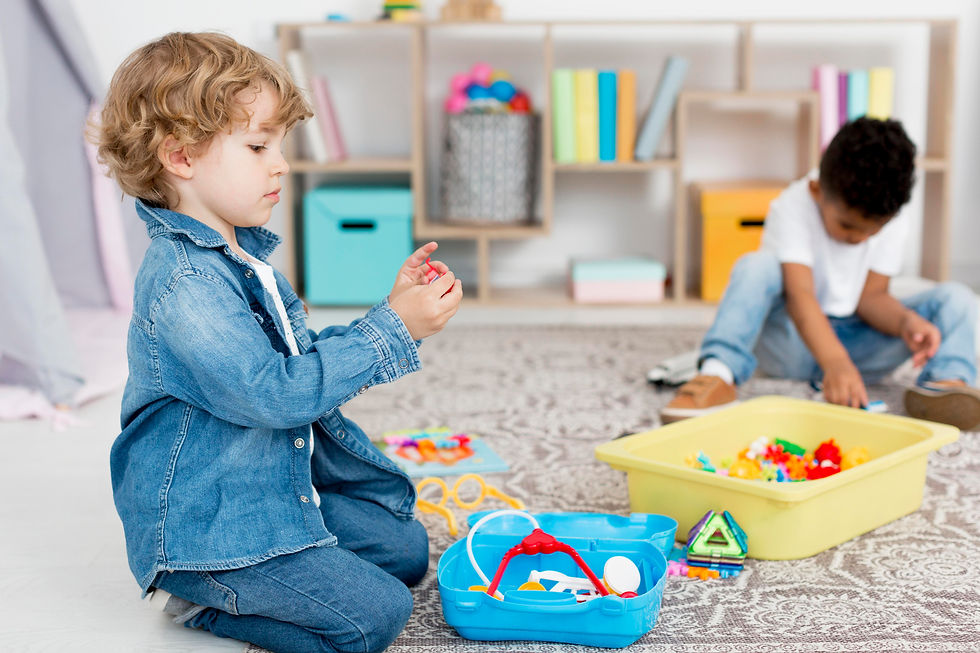Determining the Right Time to Start Daycare for Your Child
- mykidsdaycarehoust
- May 31, 2024
- 4 min read
Updated: 2 days ago

Are you contemplating when the right time is to start daycare for your little one? It's a question that often comes with a swirl of emotions and considerations. As parents, we want what's best for our children, and that includes making informed decisions about their early education and social development. Little Learners Lighthouse understands these concerns, and as a trusted daycare facility, we provide valuable insights into this important decision-making process.
When to Enroll in Daycare: Finding the Perfect Timing
For many families, the question of when to enroll their child in daycare looms large. It's natural to wonder about the right time to begin daycare and what age is best suited for this transition. At Little Learners Lighthouse, we understand the importance of finding the prime age for daycare entry, and we're here to offer some insights to help you make this decision.
The Right Time to Start Daycare: Factors to Consider
Deciding on the appropriate time to start daycare involves considering various factors unique to your family's circumstances. While there's no one-size-fits-all answer, there are some key elements to keep in mind as you weigh your options.
Child's Developmental Stage:
Every child is different, and their readiness for daycare can vary based on their developmental milestones. Some children may thrive in a daycare setting at an early age, while others may benefit from waiting until they're a bit older.
Observing your child's social, emotional, and cognitive development can provide valuable insights into their readiness for daycare.
Parental Work and Schedule:
The need for daycare often arises from parental work commitments or other obligations. Consider your work schedule, childcare options, and support network when determining the right time to begin daycare.
Finding a balance between your child's needs and your own responsibilities is essential for a smooth transition.
Socialization Opportunities:
Daycare offers valuable socialization opportunities for children, helping them develop important skills such as communication, cooperation, and empathy.
Assessing your child's exposure to social interactions outside the home can help gauge their readiness for daycare and the benefits it can provide.
Quality of Daycare Facilities:
Choosing the right daycare provider is crucial for your child's well-being and development. Researching daycare centers like Little Learners Lighthouse can help you assess their programs, facilities, and approach to childcare.
Visiting potential daycare centers, asking questions, and seeking recommendations from other parents can aid in making an informed decision.
Prime Age for Daycare Entry: What Experts Say
Experts often recommend that children begin daycare around the age of one or two, as this is when many children start to show interest in interacting with peers and exploring their surroundings.
However, there's no hard and fast rule, and some children may benefit from starting daycare earlier or later depending on their individual needs and family circumstances.
At Little Learners Lighthouse, we recognize that every child is unique, and we tailor our programs to support children's diverse needs and developmental stages.
Whether your child is just beginning to take their first steps or is eager to embark on new adventures, our nurturing environment provides a safe and enriching space for growth and learning.
Benefits of Early Socialization in Daycare
Research suggests that early socialization in daycare can have numerous benefits for children. From fostering communication and social skills to promoting independence and emotional resilience, the experiences gained in a daycare setting can positively impact a child's development.
Little Learners Lighthouse recognizes the importance of providing a nurturing environment where children can learn, grow, and thrive alongside their peers.
Appropriate Time to Start Daycare: Trusting Your Instincts
Ultimately, the decision of when to start daycare is a personal one that requires careful consideration and trust in your instincts as a parent. By weighing the factors discussed above and seeking guidance from trusted resources like Little Learners Lighthouse, you can feel confident in making the right choice for your family.
Daycare Starting Age Advice: Embracing the Journey
As you embark on this journey of deciding when to begin daycare for your child, remember that it's okay to take your time and explore your options. Trust in your intuition, gather information, and seek support from professionals and fellow parents along the way. With patience, understanding, and a gentle approach, you'll find the perfect timing for your child's daycare journey.
At Little Learners Lighthouse, we're here to support you every step of the way. From providing a nurturing environment to fostering a love for learning, we're committed to helping your child thrive and grow. Together, let's embark on this exciting chapter of your child's development and make the transition to daycare a positive and enriching experience for the entire family.
Conclusion
In conclusion, deciding the right time to start daycare depends on your child’s development, family schedule, and the quality of the daycare center. While many experts recommend starting around age one or two, every child is different, and parental intuition is important. By gathering the right information and choosing a supportive environment like Little Learners Lighthouse, you can ensure a smooth and positive transition that supports your child’s growth and love for learning.
FAQs
What is the right age to start daycare?
The right age depends on your child’s developmental readiness and your family’s needs.
How do I know if my child is ready for daycare?
Signs of readiness include social interest, curiosity, and the ability to adjust to simple routines.
What should I consider when choosing a daycare facility?
Consider reputation, staff qualifications, safety standards, curriculum, and location convenience.
How can daycare benefit my child?
Daycare supports social skills, independence, emotional growth, and early learning development.
How can I ease my child's transition into daycare?
Gradual introduction, positive communication, consistent routines, and comfort items can make the transition smoother.






Comments